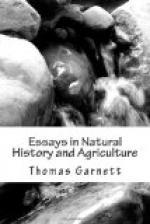Then again, gentlemen who want to have the reputation of being skilful anglers, employ their game-keepers to find the Kippers (Scottice Kelts) or spawned fish in the pools, which is a very easy matter in low water, and dropping a hook baited with a lob worm before their noses, it is greedily taken, and the poor fish (which are unfit for food) are caught. It is then trumpeted forth to the angling world that Mr. A. B. has had splendid sport—he has caught a dozen Salmon with the rod in a single day, meaning it to be understood that these fish have been caught with the fly. I by no means uphold these practices, neither do I think them very deserving of censure in the present state of the law, for all the good fish are taken near the mouths of the rivers.
This leads me to consider the defects of the present law, which is by no means adapted to protect and increase the breed of Salmon.
In the first place, the close time is too short. It commences in the Ribble nominally (for in reality the fish are openly killed all the year through) on the 15th September, and ends on the 31st of December; whereas it ought to extend to the end of April, for the following reasons. A very large proportion of the fish are spawning in January and February, and I have even seen a spawning fish as late as the 3rd of April. In the evidence given before the House of Commons in 1825, it was proved by a fisherman from the Tweed, that in March for one clean fish that was caught there were ten caught that were not so, as they were either fish that had not spawned, or Kelts, that is, fish which have finished spawning but have not returned to the sea, and are then flabby, unwholesome, and unfit for food. A very large proportion of these Kippers or Kelts do not go to the sea until April, and not then without there is a fresh in the river, for, like the Smolts, they seem disposed to remain in the rivers until they can avail themselves of the assistance of a flood, to enable them more easily to reach the sea.
Another defect in the present law is that it fails to secure a supply of good fish to the upper proprietors. There are no provisions in it (or they are not enforced) for giving the fish a free passage, no prohibition of nets, traps, or devices for stopping them in their progress up the rivers. No daily or weekly close time, but everywhere there is so short-sighted a selfishness, that it is completely realizing the fable of the man who killed the goose which laid the golden egg. The fisheries are declining so rapidly, that unless something is done, and done quickly, the breed of Salmon will be extinct in the rivers in this neighbourhood.
Again, there is no power to appoint or pay conservators, and without their assistance there is no chance of preserving Salmon in the spawning beds. Game-keepers are most certainly not to be depended upon.




